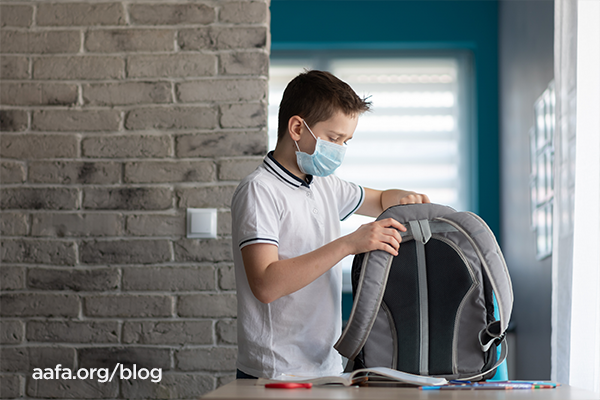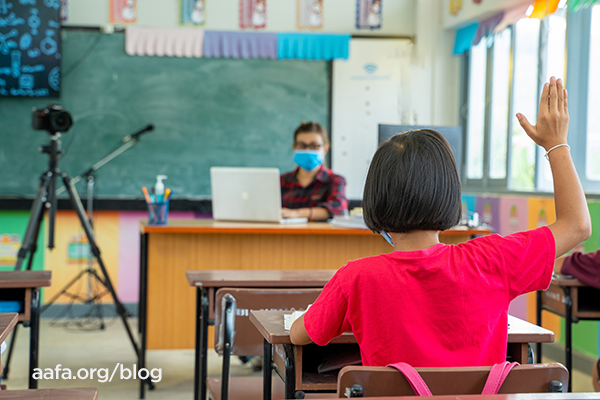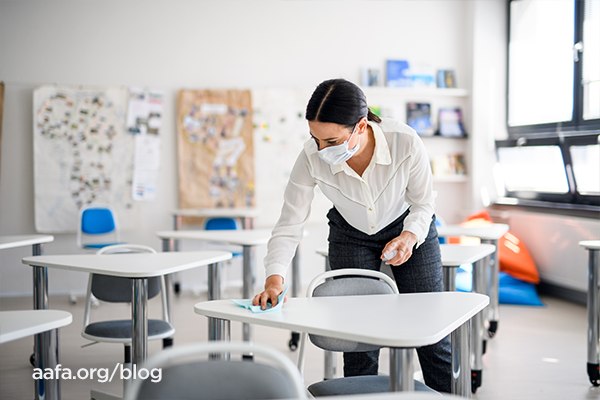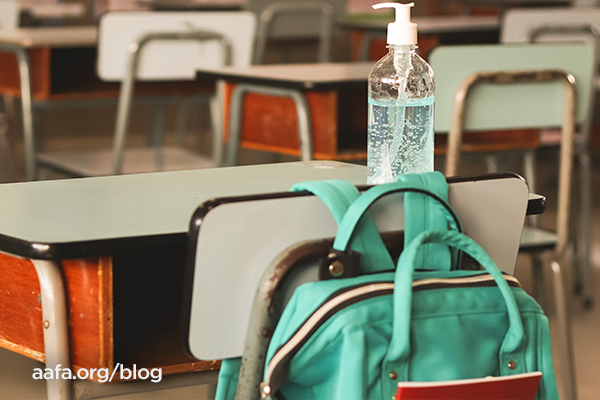Even though COVID-19 will change how schools operate for the 2020-2021 school year, children with asthma and allergies need to have a school health care plan in place if they are returning to in-person learning. Physical distancing, extra hand-washing, face masks and coverings, and other school policies may impact your child’s care plan.
What Is a School Health Care Plan?
A school health care plan is a document (or set of documents) that outlines your child’s medical condition and how it should be managed while at school. A school health care plan can help protect your student and keep them healthy.
These are the three most common care plans:
- An emergency care plan (ECP) is a medical plan from your child’s doctor for the school to follow. It also lists the student’s allergies, asthma triggers, symptoms and emergency treatment instructions.
- An individualized health care plan (IHCP) is a type of nursing care plan. The school nurse often creates it with the family, student, teachers and doctors. An IHCP addresses what the school will do to keep a safe school environment. It often contains an ECP.
- A 504 plan is a legal contract between the school and the student. The 504 plan is a legal document. It gives you and your child more protections if the school does not follow the plan. It also has guidelines for changes to make in the classroom or other areas to provide a safe education.
Will My Child’s School Health Care Plan Need to Change Because of COVID-19 Policies and Processes?
Most schools in the U.S. are implementing new policies this year to help prevent the spread of the virus that causes COVID-19. This could include physical (social) distancing, extra hand-washing, face masks or coverings, increased site cleaning and sanitizing, and changes in scheduling. If your child has asthma or allergies, think about how new policies and practices could affect your child. Then talk to the school administrators.
Here are some examples of questions you may want to ask your child’s school:
What type of school health care plan will be best for my child?
If your child will be returning to school for in-person learning, review AAFA’s COVID-19 and Asthma Toolkit for Schools for ways new procedures – such as cleaning – might impact students with asthma. Look for possible items that may need to be added to your child’s health care plan.
Request copies of the school’s health forms now, if you haven’t already. Contact your child’s doctor to find out how they are handling school health forms. Many doctors have fewer available appointments and added restrictions to ensure physical distancing. It may take longer to get forms signed because of this. Ask about any updates to your child’s Asthma Action Plan that might be needed.
If your child has an ECP and you have any concerns about new procedures that you can’t note on the school health forms, consider asking for a meeting or phone call. If your child doesn’t have a 504 plan and you think they will need one, start the process right away. If your child already has a 504 plan, decide if you need to request a meeting, video conference or phone call with the school. You and the school may find it easier to first talk with the school staff about how to keep your child safe. If your child is attending school virtually (online at home), you probably won’t need a 504 plan. But if you are concerned about a high number of absences and doctors’ appointments because of their asthma, you might need a 504 plan that covers this.

Where will emergency medicines be stored? How will your child be supervised to take their medicine if needed?
Your child’s quick-relief or “rescue” medicine should be easily and quickly accessible and not increase the risk of being exposed to the new coronavirus. Every state protects a child’s right to self-carry their emergency medicine. Discuss with your child’s doctor if they are ready to self-carry their medicine. If your child will not self-carry, find out where medicines will be kept. The school may ask for a second inhaler, and spacer if used, to keep in a designated location even if your child self-carries their medicine.

What will the procedure be if my child needs to use their asthma inhaler?
If your child has to use their inhaler, they have to remove their mask. This could expose your child or other children to the new coronavirus, even if the children don’t have symptoms. Many people with COVID-19 don’t have symptoms or may be contagious before they show symptoms. It’s best if your child can see the school nurse if they have symptoms and use their inhaler in a space away from other staff and children. The school nurse can also assess any respiratory symptoms for signs of COVID-19.
If your child normally uses a nebulizer for their emergency asthma treatment, discuss options for using an inhaler with your child’s doctor and the school nurse. Nebulizers can spread coronavirus particles into the air. According to the Centers for Disease Control and Prevention (CDC), people with asthma should use inhalers with spacers (with or without a face mask, according to each student’s individual treatment plan) instead of nebulizer treatments whenever possible during the COVID-19 pandemic. Based on limited data, the use of asthma inhalers (with or without spacers or face masks) does not appear to release coronavirus particles into the air. A spacer or valved holding chamber is recommended when using an MDI.

Will the school cleaning plan increase your child’s exposure to potential asthma triggers?
Strong scents and cleaning chemicals, especially cleaning sprays, can trigger asthma symptoms. Find out if cleaning will be done while the students are present and what kind of products will be used. Refer to our COVID-19 and Asthma Toolkit for Schools for information on asthma-friendly cleaning.

If your child has food allergies, find out how the school plans to handle meals.
The CDC has recommended that students eat meals in their classrooms. If your child has a school health care plan that states food cannot be eaten in the classroom, that may change due to COVID-19 policies. There are other ways to keep your child safe. These changes will mean more frequent desk cleaning and hand-washing. Physical distancing can help reduce exposure to food as well. Talk to your child’s school to figure out other ways to prevent food allergy reactions.
Food allergens can hide in some soaps and hand sanitizers. You may want to find out if you can send in soap or hand sanitizer from home. Ask how they will ensure your child has access to it. And remember, hand sanitizer doesn’t remove food proteins from hands, but hand-washing does.

If your child has eczema (atopic dermatitis), ask about hand-washing and hand sanitizer use.
Antiseptic soaps and hand sanitizers can be hard on the skin, especially for people with eczema. Consider working with your child’s school to make sure your child can wash their hands with a gentler soap instead of using hand sanitizer. You may want to ask if you can send soap from home. And make sure your child will have access to an eczema-friendly moisturizer after they wash their hands.

Where Can I Find More COVID-19 School Resources?
Schools will face a lot of challenges during the 2020-2021 school year. AAFA created resources to help school nurses, administrators, staff and teachers. Check out the resources below and share them with your child’s school.
COVID-19 and Asthma Toolkit for Schools
This toolkit provides guidance to help schools as they develop their policies and procedures. This toolkit is a supplement to current district, state and CDC guidelines.
COVID-19 Guidelines for Schools and the Impact on Kids With Food Allergies and Asthma
New school policies may change how food allergies are handled in schools. This blog post looks at how these changes could affect kids with food allergies. We also include helpful information for parents and school staff.
It’s important to know how to prevent life-threatening medical emergencies, especially during the COVID-19 pandemic. Make a pact to “ACT” for asthma and allergy. Follow these three steps to reduce your chance of having an asthma or allergy emergency:
- Have an action plan for asthma or anaphylaxis.
- Carry your medicines and wear a medical ID.
- Have a treatment plan that includes when to take your medicines and what to do in an emergency.







Comments (2)